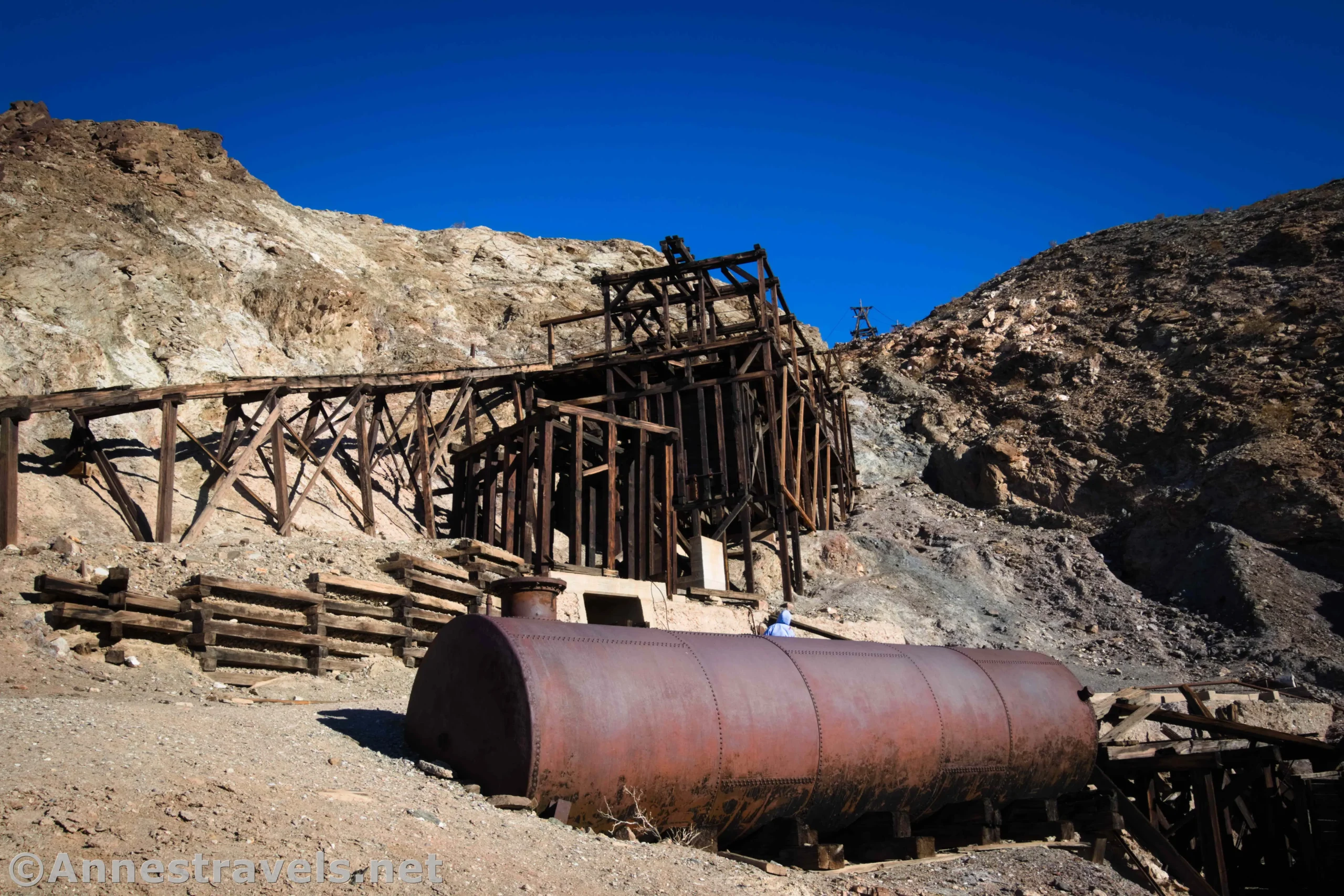
Keane Wonder Mill & Ruins – Death Valley National Park
Enjoy a short hike to the remains of the famous Keane Wonder Mine’s ore processing facilities.
| Total Distance: 0.8 miles out & back with spur | Elevation Gain: 354ft. (1,324ft. to 1,417ft.) |
| Difficulty: Easy | 0-5 Mile Difficulty: Easy |
| View Rating: 3.0 out of 5.0 stars | Author’s Rating: 4.0 out of 5.0 stars |
| Visitor Rating: (Click to rate) [Total: 0 Average: 0] | Visitor Difficulty Rating: (Click to rate) [Total: 0 Average: 0] |
| Pets: No | Horses: No |
| Best Seasons: October to May | Special Permits: None |
| Water Availability: None | Overnight Options: None |
| Trailhead Amenities: None | Crowd Factor: Moderate to Crowded |
| Trailhead Access: 1.2 | |
| Uses: | Trail Surface: |
| Features: | Hazards: |
Mile-by-Mile: Keane Wonder Mill & Ruins Trail
0.0 Keane Wonder Trailhead (1,324ft.). Follow the very steep, well-defined trail up the hillside. (36.6680000°, -116.9104500°)
0.1 Trail Junction (1,411ft.). Trails branch left, sharp left, and right. Turn right downhill to the sign near the old mill ruins. (36.6691984°, -116.9095183°)
0.15 Mill Ruins (1,406ft.). Stay on the trail, but you can explore around the old mill area. When you’re done looking around here, return to the trail junction. (36.6694167°, -116.9089500°)
0.2 Return to Trail Junction (1,411ft.). Turn onto the trail that would have been a sharp left when you were coming up from the parking lot. (Taking the middle trail will bring you up to the Keane Wonder Mine.) The trail is fairly flat and winds its way behind the side of the hill. (36.6691984°, -116.9095183°)
0.4 Outhouse (1,409ft.). This is pretty much the end of this section of trail. Respectfully enjoy any of the other ruins around the trail and then return to your vehicle. (36.6699000°, -116.9111333°)
History & More
There was once a stamp mill at the site of the mill ruins. It was eventually sold to a company in Los Angeles. A cyanide processing plant was located just down the hill. The chemicals were used to extract gold from the tailings left over from processing the ore in the stamp mill.
In 1903, Jack Keane and his friend Domingo Etcharren traveled into Death Valley to look for gold. Domingo gave up after a while, but on his way out, he discovered a vein of gold. He returned long enough to tell Jack of his find before walking back out to civilization. Jack Keane did some tests and found that the gold was not only high quality, but also easy to extract from the ground. The area was developed by Joseph DeLamar and then by Homer Wilson, who brought the mine into a profitable venture, including building the aerial tramway. By November of 1906, the mine was producing gold.
The aerial tramway was a feat of engineering, especially for its day. Ore buckets were automatically loaded with 600lb. of ore, the clutch was released, and the next ore bucket would be automatically pulled into position to be filled (the weight of the ore carried the buckets down the mountain). At the base of the tramway, the ore was dumped out and the buckets returned to the top of the mountain for more ore.
The gold ore from the Keane Wonder Mine was only partially processed on-site. The on-site 20-stamp mill could extract about 62% of the gold ore; when the cyanide plant was installed, it was able to recover 92% of the gold extracted from the mine. After being partially processed, the ore was transported to Rhyolite for final processing.
Download Trail Map
Coming soon!
Driving Directions
From Furnace Creek, take CA-190 north 10.6 miles to the junction for the Beatty Cutoff. Turn right toward Beatty. After 5.7 miles of driving north, turn right on the gravel road to the Keane Wonder Mine Trailhead, 2.8 miles later.
It is extremely dangerous to enter a mine due to unstable shafts, gasses, and more. Do not enter mines, even if they are apparently open!
Walking on, climbing, entering, ascending, descending, or traversing any mine, structure, feature, or ruin is prohibited.
Toxic chemicals or ore may be present around mine sites. Enter at your own risk.
Possessing, destroying, injuring, defacing, removing, digging, or disturbing any mine, structure, feature, or ruin is also prohibited.
Leave No Trace Principles are enforced
Drones and model aircrafts are prohibited
Camping is permitted only in designated sites or in areas open to dispersed backcountry camping
All park rules and regulations
12 Month Pass: $55/Death Valley Annual Pass (valid at Death Valley National Park). $80/America the Beautiful Annual Pass (valid at all national park and federal fee areas). $20/Annual Senior Pass (62 years or older US citizens; valid at all national park and federal fee areas). Free/4th Grade Pass (Valid Sept. 1-August 31 of the child’s 4th Grade school year). Free/Military Pass (valid for all active military personel and their dependents with a CAC Card or DD Form 1173).
Lifetime Pass: $80/Lifetime Senior Pass (62 years or older US citizens; valid at all national park and federal fee areas). Free/Access Pass (available to all US citizens with perminent disabilities). Free/Access for Veterans and Gold Star Families Pass (valid for all military and veterans with a CAC card, Veteran HJealth Identification Card, Veteran ID Card, or veteran’s designation on state-issued drivers license or identification card.)













2 thoughts on “Keane Wonder Mill & Ruins – Death Valley National Park”